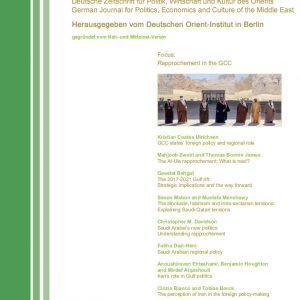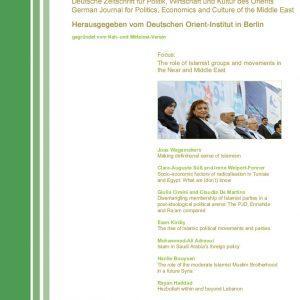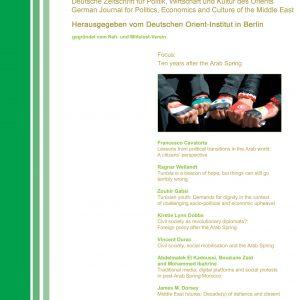Shop
Showing 177–192 of 331 resultsSorted by latest
-

Orient III 2021
26,00 €incl. VAT
plus Shipping Costs
Select options This product has multiple variants. The options may be chosen on the product page -

Disentangling membership of Islamist parties in a post-ideological political arena: The PJD, Ennahda and Ra’am compared
7,90 €incl. VAT
Add to basket -

The role of the moderate Islamist Muslim Brotherhood in a future Syria
7,90 €incl. VAT
Add to basket -

Socio-economic factors of radicalisation in Tunisia and Egypt: What we (don’t) know
7,90 €incl. VAT
Add to basket -

The rise of Islamic political movements and parties
7,90 €incl. VAT
Add to basket -

Orient II 2021
26,00 €incl. VAT
plus Shipping Costs
Select options This product has multiple variants. The options may be chosen on the product page -

Islam in Saudi Arabia’s Foreign Policy
7,90 €incl. VAT
Add to basket -

Hezbollah within and beyond Lebanon
7,90 €incl. VAT
Add to basket -

Making definitional sense of Islamism
7,90 €incl. VAT
Add to basket -

Middle East futures: Decade(s) of defiance and dissent
7,90 €incl. VAT
Add to basket -

Traditional media, digital platforms and social protests in post-Arab Spring Morocco
7,90 €incl. VAT
Add to basket -

Civil society, social mobilisation and the Arab Spring
7,90 €incl. VAT
Add to basket -

Orient I 2021
26,00 €incl. VAT
plus Shipping Costs
Select options This product has multiple variants. The options may be chosen on the product page -

Civil society as revolutionary diplomats?: Foreign policy after the Arab Spring
7,90 €incl. VAT
Add to basket -

Lessons from political transitions in the Arab world: A citizens’ perspective
7,90 €incl. VAT
Add to basket -

Tunisian youth: Demands for dignity in the context of challenging socio-political and economic upheaval
7,90 €incl. VAT
Add to basket




